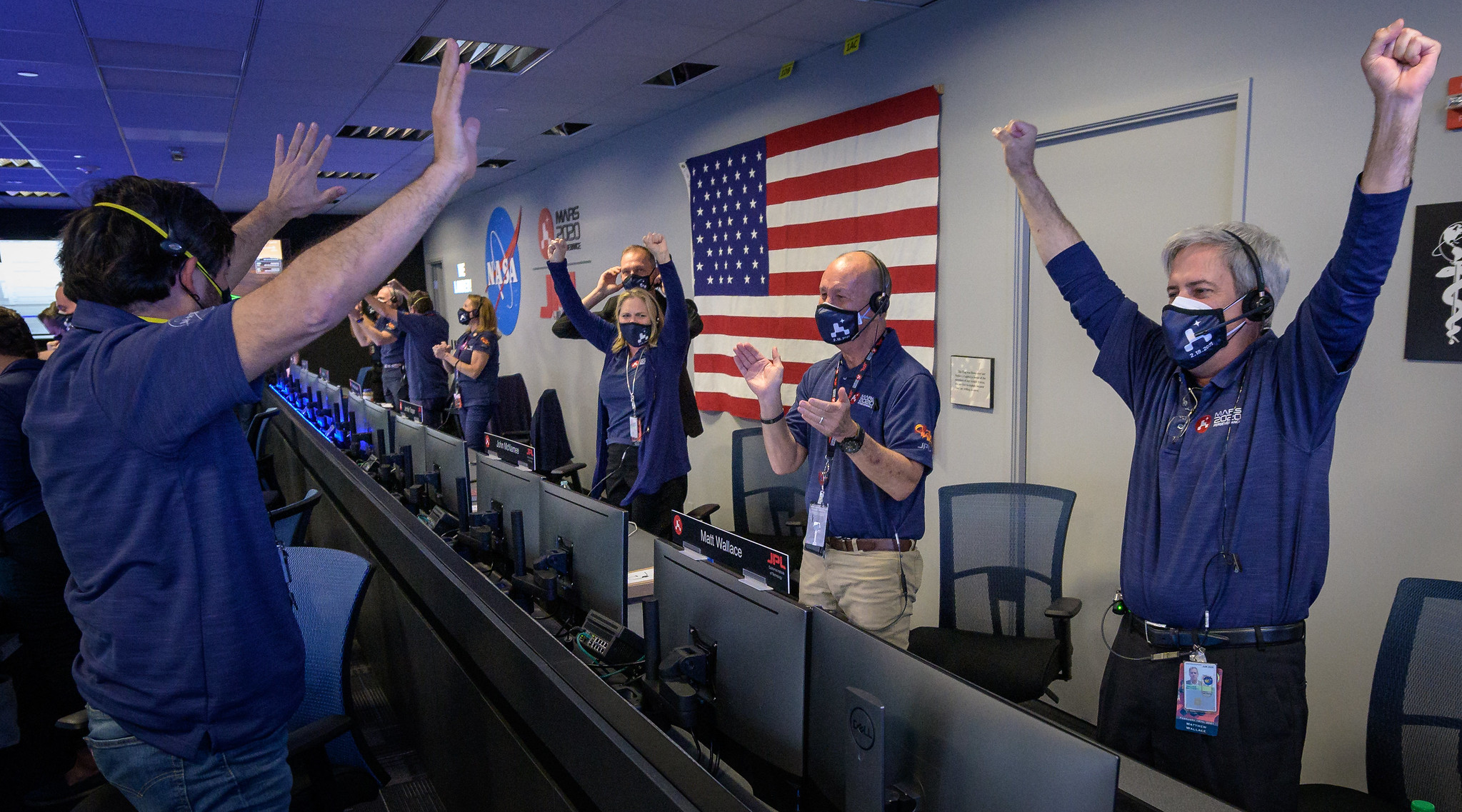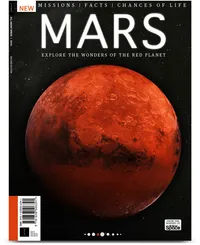We did it: Celebrating a Mars rover landing in the time of COVID-19
"Science is really a power that can unite us."
PASADENA, Calif. — After a year of seemingly endless obstacles and challenges imposed by the coronavirus pandemic, something good finally happened. Amidst the chaos and strife, NASA landed its most ambitious robotic explorer ever on the surface of Mars.
On Thursday (Feb. 18), a bright light shone as people around the world celebrated the Perseverance Mars rover landing safely in Jezero Crater, an ancient lakebed on the Red Planet's surface. As I watched the rover's descent to the Martian surface in (almost) real-time from NASA's Jet Propulsion Laboratory (JPL) here, the landing was a welcome respite following a truly grueling year.
I could see it on people's faces (or, rather, in their eyes above their masks), and I could feel it in the air. This mission didn't just propel technology and science forward, it demonstrated the incredible perseverance of the human spirit. In spite of everything, the teams at NASA were able to accomplish this incredible feat, which, even in "normal times," would have been difficult.
"It's been a tough year. It's been tough to do this mission in this environment. But the team, like they have with every other challenge, has stepped up to it … and I think that's going to continue into the future," Perseverance deputy project manager Matt Wallace, of JPL, said during a post-landing news conference on Thursday (Feb. 18).
Related: Here's the 1st photo from NASA's Perseverance rover!
Live updates: Follow the Perseverance Mars rover mission
Book of Mars: $22.99 at Magazines Direct
Within 148 pages, explore the mysteries of Mars. With the latest generation of rovers, landers and orbiters heading to the Red Planet, we're discovering even more of this world's secrets than ever before. Find out about its landscape and formation, discover the truth about water on Mars and the search for life, and explore the possibility that the fourth rock from the sun may one day be our next home.
Join our forums here to discuss the Perseverance Mars rover landing. What do you hope finds?
COVID-19 and NASA
2020 saw over 110 million cases of COVID-19 and 2.43 million deaths caused by the novel coronavirus. Those numbers are still rising as the coronavirus pandemic continues around the world. The virus' spread brought global loss and grief along with widespread changes in our day-to-day life. Schools and businesses shut down, and new procedures went into place as we worked to adapt our lives to better protect each other.
But science didn't stop with COVID-19. NASA scientists and engineers were planning and working on Perseverance's mission, officially known as Mars 2020, long before the pandemic. And with Perseverance scheduled to launch in the summer of 2020, the agency had to figure out how to get to Mars when humans couldn't even safely be in the same room together.
Breaking space news, the latest updates on rocket launches, skywatching events and more!
Related: President Biden hails Mars landing of NASA's Perseverance rover
The stakes were high: Missing the roughly month-long launch window would have delayed the $2.7 billion mission by more than two years. (Mars and Earth align favorably for interplanetary missions just once every 26 months.)
NASA took action early in the pandemic, changing its operating procedures to try and prevent the spread of COVID-19. This meant that many scientists, engineers and technicians who weren't working on essential mission activities moved their work home. Essentially, the agency had to figure out how to launch and then land a rover on Mars with a huge portion of the team working from their living rooms.
"Our workplace is a little different," Wallace said during a news conference on Wednesday (Feb. 17). "We've got masking requirements and social distancing requirements.Our mission support area will be a little less dense than we have before."
"Because of COVID, the four or five hundred members of the science team can't be all together at JPL. We normally are jumping up and down, yelling and screaming with the engineers. We can't do that," Jim Bell, principal investigator of Perseverance's Mastcam-Z instrument, added in a news conference on Tuesday (Feb. 16).
Related: Perseverance rover carries tribute to COVID-19 healthcare workers
"Frankly, I'm getting slightly emotional," Thomas Zurbuchen, the associate administrator for NASA's Science Mission Directorate, told Space.com at JPL on landing day (Feb. 18, 2021). What moved him so was how the teams at NASA have persisted and made this mission possible despite the challenges that COVID-19 brought.
"I think this rover is exactly at the level of quality that we would've done without COVID, it's exactly at the level of maturity in terms of software as we would have done without COVID," he added. And this is all possible "because of the team coming together and standing as one. So Perseverance is not just the name of the rover, it's what describes this team."
Going forward safely
Now, with Perseverance down safely on Mars, this remote work will continue as NASA science teams begin to use the rover and its instruments to work on the mission's science objectives.
"It's different than ever before," Perseverance project scientist Ken Farley, also of JPL, said during a news conference on Wednesday.
"The science team is not going to be shoulder-to-shoulder doing this for the foreseeable future, we are going to be operating remotely," he said. "So, literally, the science mission is going to be executed from people's living rooms and bedrooms, all around the country and all around the world. It's spectacular that we are able to do that. It's a big challenge, and I think we are ready to do that."
Zurbuchen agreed and shared that he thinks that this accomplishment "shows that individuals coming together can do amazing things even in adverse situations. So for me, when I think of Perseverance and that team I also get very hopeful."
"Science is really a power that can unite us," he added on landing day.
Email Chelsea Gohd at cgohd@space.com or follow her on Twitter @chelsea_gohd. Follow us on Twitter @Spacedotcom and on Facebook.

Chelsea “Foxanne” Gohd joined Space.com in 2018 and is now a Senior Writer, writing about everything from climate change to planetary science and human spaceflight in both articles and on-camera in videos. With a degree in Public Health and biological sciences, Chelsea has written and worked for institutions including the American Museum of Natural History, Scientific American, Discover Magazine Blog, Astronomy Magazine and Live Science. When not writing, editing or filming something space-y, Chelsea "Foxanne" Gohd is writing music and performing as Foxanne, even launching a song to space in 2021 with Inspiration4. You can follow her on Twitter @chelsea_gohd and @foxannemusic.


